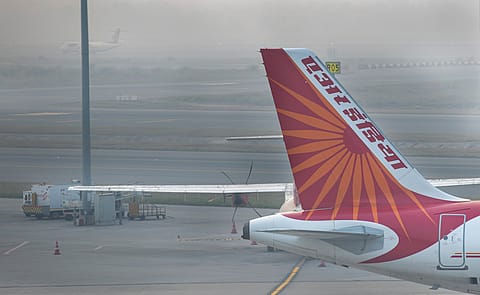Vihaan.AI: Air India unveils 5-point plan for revival
Air India’s new transformation plan aims to capture at least 30% market share in domestic market in next five years.

In line with its revamp strategy, the Tata group-owned Air India has unveiled a transformation plan called 'Vihaan.AI'. The new plan is a comprehensive multi-stage revival roadmap to catapult Air India into a world-class airline and claim at least 30% market share in the domestic market in the next five years.
"Over the next 5 years, Air India will strive to increase its market share to at least 30% in the domestic market, while significantly growing the international routes from the present market share. The plan is aimed at putting Air India on a path to sustained growth, profitability and market leadership," says the Tata group airline, which up until this year was struggling with mounting losses and huge debt.
As per the latest available DGCA data, Air India's domestic market share stands at 8.4% as of July 31, 2022, while the market leader IndiGo's market share is 58.8%. Tata's other companies Air Asia India and Vistara hold 4.6% and 10.4% market share, respectively.
Air India's new plan “Vihaan.AI” means the dawn of a new era in Sanskrit. It has been launched to restore Air India's legacy and to make it a world-class, digital, Indian airline, says the company.
The man-in-charge behind Air India's transformation plan is newly-appointed CEO, Campbell Wilson, who joined the company in May 2022.
So what is Vihaan.AI? Vihaan.AI, which has been developed after extensive feedback from Air India employees, focuses on five key pillars -- exceptional customer experience, robust operations, industry-best talent, industry leadership, and commercial efficiency and profitability.
Air India says in short term, its focus is on fixing the basics and readying itself for growth (taxiing phase), but the more medium-to-long term focus will be on building for excellence and establishing scale.
Recommended Stories
Wilson says this marks the start of a historic transformation for Air India. "We are laying the foundation for a brave new Air India, with a renewed sense of purpose and incredible momentum."
Some of the transformation work has already started, he says. A slew of initiatives in areas like refurbishing cabins, serviceable seats, and in-flight entertainment systems are already underway. "We are also adopting proactive maintenance and refining flight schedules to enhance on-time performance. Our fleet expansion will involve a combination of both narrow-bodied and wide-bodied aircraft to cater to varied network needs."
The airline this week announced its first major fleet expansion since the acquisition by the Tata group. It will induct 30 leased aircraft from Airbus SE and Boeing Co. These aircraft will result in Air India offering premium economy haul flights for the first time. The airline plans to use these aircraft for domestic routes and short-haul global destinations. For this, Air India has signed leases and letters of intent for 25 Airbus narrow-body and 5 Boeing wide-body aircraft. These aircraft, which will enter service in late 2022, will increase its fleet by over 25%.
The airline has reportedly earmarked $1.9 billion to expand Air India's operations in the next two years. This will mark the complete overhaul of the iconic airline, which up until last year was standing on a shaky foundation amid mounting losses and huge debt. The government sold its entire stake in Air India to Talace, a wholly-owned subsidiary of Tata Sons, on 27 January 2022. The sale marked the national carrier’s return to the salt-to-software conglomerate after a span of 69 years.
(INR CR)